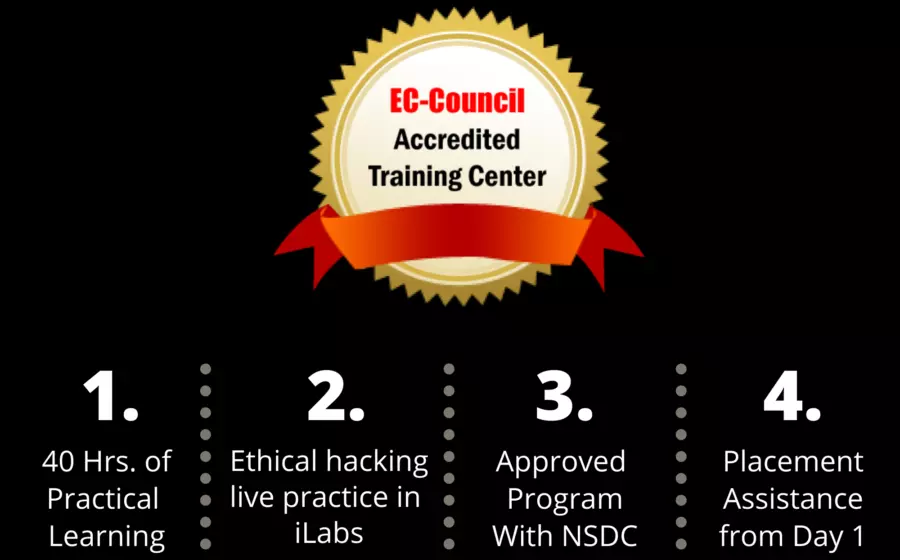CEHv11 Course Details
CEH Course Content / Exam(s)
With the massive increase in connected devices to exchange information and businesses move to digitization at a faster pace than ever before, the devices, networks, and systems’ security remain at stake, and more vulnerable to information and data threats and hacking incidents. is highly prone to. Companies strive to hire highly Cyber Security professionals to build and maintain hack-proof organizational infrastructure, creating a skyrocketing demand for Certified Ethical Hackers.
EC-Council’s CEH V11 certification training focuses to train aspiring security professionals to gain essential ethical hacking skills with the practical implementation of scanning, testing, hacking, and securing the systems. The CEH V11 training and certification from ICSS features:
- Inducing “think like hacker” approach in the participants
- Explains the functioning of the perimeter defenses, scan and hacking networks without affecting the real networks to identify vulnerabilities
- Demonstrates the exploitation of privileges by intruders and fool-proof security measures to protect the security architecture of the organization
- Real-like test environments to help participants explore their acquired skills
- Interactive theory and lab sessions delivered by industry experts having several years of experience.
Successful completion the CEH V11 certification training empowers you with across the board understanding of:
- Ethical hacking concepts, cyber kill chain concepts, an overview of information security, security controls, and various laws and regulations related to information security.
- Footprinting concepts and methodologies and utilizing footprinting tools along with the countermeasures
- Performing network scans, host and port discovery by utilizing different scanning tools
- Enumeration techniques that now includes NFS enumeration and related tools, DNS cache snooping, and DNSSEC Zone walking along with the countermeasures
- Concepts of vulnerability assessment, its types, and solutions along with a hands-on experience of industrial tools used
- Phases of system hacking, attacking techniques to obtain, escalate, and maintain access on victim along with covering tracks.
- Malware threats, analysis of various viruses, worms and trojans like Emotet and battling them to prevent data. APT and Fileless Malware concepts have been introduced to this domain.
- Packet sniffing concepts, techniques, and protection against the same.
- Social engineering concepts and related terminologies like identity theft, impersonation, insider threats, social engineering techniques, and countermeasures
- Denial of Service (DoS) and Distributed Denial of Service (DDoS) attacks, use cases, and attack and defense tools
- Security solutions like firewall, IPS, honeypots, their evasion, and protection
- Web server and web application-based attacks, methodologies
- SQL injection, hijacking, and evasion techniques
- Wireless encryption, wireless hacking, and Bluetooth hacking-related concepts
- Mobile device management, mobile platform attack vectors, and vulnerabilities related to Android and iOS systems
- Operational Technology (OT) essentials, threats, attack methodologies, and attack prevention. The concept of OT is a new addition.
- Recognizing the vulnerabilities in IoT and ensuring the safety of IoT devices
- Encryption algorithms, Public Key Infrastructure (PKI), cryptographic attacks, and cryptanalysis
- Cloud computing, threats and security, essentials of container technology and serverless computing
| Module 01: Introduction to Ethical Hacking | Module 11: Session Hijacking |
|---|---|
| Module 02: Footprinting and Reconnaissance | Module 12: Evading IDS, Firewalls, and Honeypots |
| Module 03: Scanning Networks | Module 13: Hacking Web Servers |
| Module 04: Enumeration | Module 14: Hacking Web Applications |
| Module 05: Vulnerability Analysis | Module 15: SQL Injection |
| Module 06: System Hacking | Module 16: Hacking Wireless Networks |
| Module 07: Malware Threats | Module 17: Hacking Mobile Platforms |
| Module 08: Sniffing | Module 18: IoT Hacking |
| Module 09: Social Engineering | Module 19: Cloud Computing |
| Module 10: Denial-of-Service | Module 20: Cryptography |
- Students
- Freshers and Job Seekers
- Defense Professionals
- Ethical hackers
- System Administrators
- Network Administrators
- Engineers
- Web managers
- Auditors
- Security Professionals
- The candidate must be pursuing graduation to become eligible for the Certified Ethical Hacker course.
- There are no specific prerequisites for joining the course, but it would be advantageous for the candidate if they have a basic knowledge of networking.
- Certification Name: 312-50 (ECC EXAM), 312-50 (VUE)
- Test Format: Multiple Choice
- Number of Questions: 125
- Test Duration: 4 Hours
- Test Delivery: ECC EXAM, VUE


